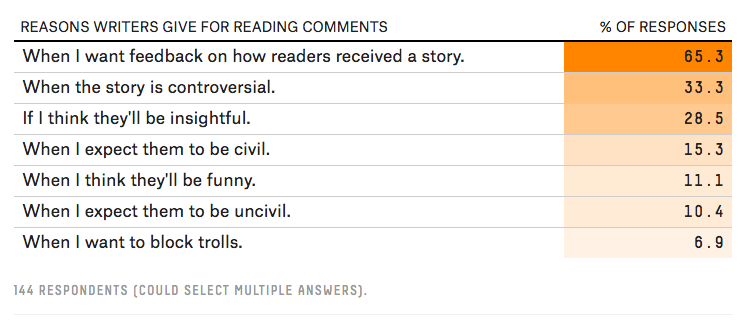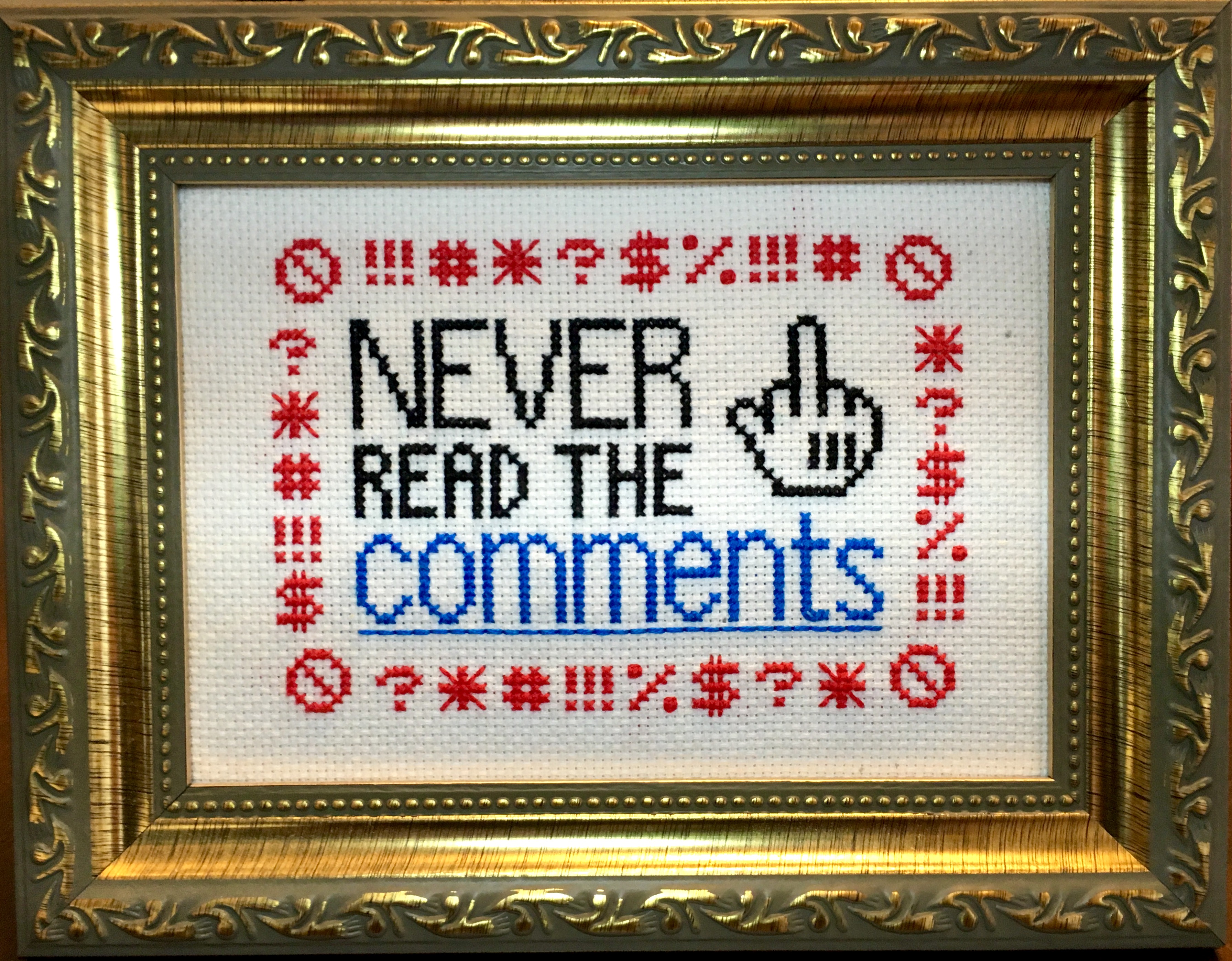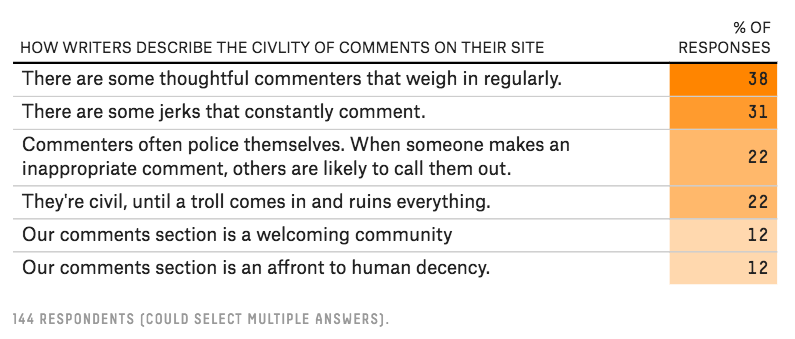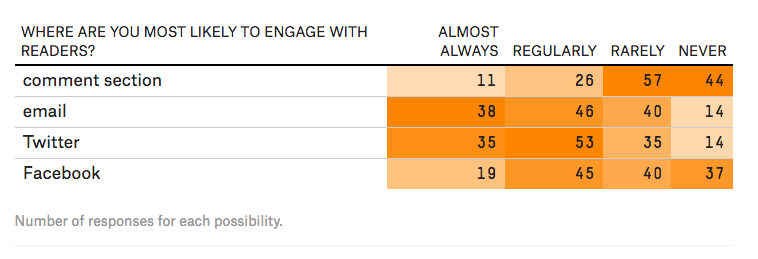I have a policy: never read the comments. This rule applies to most of the publications where my work appears online, such as FiveThirtyEight, Slate and The Washington Post. (LWON is the exception. Comments left here require approval before they’re posted, and I read them all.)
It might seem unfriendly to ignore people who are interested enough in my stories to share their thoughts, but by the time a story is published, it’s usually been occupying my headspace for a while and I need to move my attention to the next piece. Discussions in the comments rarely seem directed at me. Instead, they’re more like a book club discussion where not everyone finished the novel, which is just a conversation starter anyway.
I do read every email I receive from readers (and do my best to reply) but I don’t have the time or energy to keep up with the back and forth in the comments. Whatever I have to say is already contained in the article I wrote, so reiterating it seems pointless. And when the comments veer toward personal critiques or attacks, it feels unwise to dignify them with a response.
While working on a recent story about what motivates people to comment, I wondered how other journalists handle comments, so I created a survey. It’s not a scientific sample, (I solicited responses via social media and I imagine that people who’d had memorable experiences with comments were probably most likely to respond) but it provides a bit of insight nonetheless.
A total of 144 writers responded to my survey, and 66 percent of them were women. Among the questions I asked was how often they read the comments on their stories. I learned that not everyone follows my rule of thumb.
 On the rare occasions when I do read the comments, it’s usually because I’ve written about a complicated or controversial subject and I’m curious about how readers have responded. Turns out, that’s a common reason.
On the rare occasions when I do read the comments, it’s usually because I’ve written about a complicated or controversial subject and I’m curious about how readers have responded. Turns out, that’s a common reason.
 I don’t expect every reader to love my work, and I’m interested in hearing other points of view if we can have a civil discussion. As a journalist, I consider it my job to keep an open mind and an eye toward new facts as they appear, but I don’t feel obligated to listen to people rant or insist that my facts aren’t true because they contradict what the person already believes. My willingness to read comments is directly correlated to their civility, and my survey results suggest that the culture of comments sections varies among sites.
I don’t expect every reader to love my work, and I’m interested in hearing other points of view if we can have a civil discussion. As a journalist, I consider it my job to keep an open mind and an eye toward new facts as they appear, but I don’t feel obligated to listen to people rant or insist that my facts aren’t true because they contradict what the person already believes. My willingness to read comments is directly correlated to their civility, and my survey results suggest that the culture of comments sections varies among sites.
Although many respondents reported having thoughtful commenters who participated regularly, there were also reports of not so welcoming comments too, many of them with a gendered or racial slant. “I am called nigger bitch and cunt so often it’s made me NEVER read comments,” one woman wrote. “White Men Have Some Thoughts About How You Can Improve,” is how one survey respondent characterized comments at his site. “Because my name is somewhat androgynous and I don’t use an author photo, the comments are have sometimes been noticeably ruder when I’m mistaken for a woman,” wrote another. “Old men hate hearing young women,” said one journalist who reported receiving complaints about her voice on the radio. Most of the female writers I know (myself included) have been blasted with misogynistic comments at some point.
Sometimes these complaints escalate. Forty-nine percent of the writers who answered my survey said they’d received some sort of harassment from commenters, and 70 percent of those who’d been harassed were women. One woman reported that she’d been doxxed on 4chan and said she’d compared notes with a male writer in a similar role and “the number of comments and reader contact I get is exponentially higher.” After writing an op-ed about sexism in her college physics department, one journalist received comments saying that she “just needed to have more sex.” One male journalist said that a reader had once created a blog devoted to criticizing his articles. (It has since disappeared.)
In some cases, it’s just a few horrible commenters creating problems. Someone at an environmental news site wrote that his site has “a solid contingent of white hat commenters who keep an eye out for trolls and help by responding to them and/or flagging to our editors for enhanced moderation tactics and potential ban/block.”
That’s the kind of approach being developed by The Coral Project, a collaboration between the Mozilla Foundation, The New York Times, and The Washington Post. The project aims to improve comments sections so that readers can engage and be heard in a civil way. The project is building tools news organizations can use to highlight good comments and incentivize meaningful contributions. “It’s easy for people within news organizations to see commenters as some other class of beings,” Coral Project head of strategy Greg Barber told me, “but that’s dangerous for us, because they’re our most loyal readers.”
After reading hundreds of comments and even talking by phone with some of FiveThirtyEight’s top commenters, I’ve come around to Barber’s point. The answers I received in my survey of commenters convinced me that there’s a critical mass of engaged readers out there who want to have a voice in the discussion and most of them aren’t just out to be jerks. The question is, how can journalists and news organizations facilitate that without empowering the trolls?
As part of their work at the Engaging News Project, Talia Jomini Stroud’s group at the University of Texas at Austin analyzed nine million comments from the New York Times to look at how people interact in the comments section. What they found was that people act as partisans in this setting. “Any way we can design it so that people think less like a partisan supporting the home team the better off we are, [in terms of civility],” Stroud said.
In their survey, Stroud’s group asked people about various ways to improve comments sections. The most highly-rated approach was having the journalist answer questions in the comment section. About 60 percent of the commenters they surveyed endorsed that idea, and Stroud points to it as a potential way to improve the civility of the comment spaces. It’s an interesting idea, but implementing it would require more time and energy than most journalists have to give.
Many readers also interact with writers using email or social media. I find these comments easier to engage with, because they’re directed at me. In my survey, the comments section was the place that journalists were least likely to engage with readers.
**
**
**
**
*
**
**
When I look at a comments section, I often feel like I’ve stepped into a party in the middle of a conversation. And the conversation isn’t always all that interesting. As reader Matthew Miller observed on my FiveThirtyEight survey page, “the longest, most passionate discussion threads develop around the most trivial issues — while big, serious, and important topics often get little or no reply.” He offered an explanation based on something that the open source software world calls “bikeshed painting” (from a 1960s book on management). “It’s easy to be involved in choosing the color of the shed — anyone can be an expert,” Miller wrote. “It’s a lot more effort to engage with bigger things — so most people just don’t.”
Public discourse often seems to gravitate toward emotion-provoking but relatively unimportant matters, and I’ve been pondering how we can facilitate nuanced conversations about more complex and important items in the news without falling into partisan bickering. How do we create a space for bringing together disparate views in a thoughtful and constructive manner? One thing I’ve learned over and over is that human beings hate being told we’re wrong, but must we also be unwilling to change our minds or at least bend them a bit in the face of new ideas or facts? When people become fixed in their views, there’s really no point in even having a conversation. How do we discourage the tendency to view public discourse as a competition with teams of winners and losers? I don’t have the answer yet, but I haven’t given up hope.
Image and cross stitch by Colleen Barry.



Christie, it is remarkable that you tackle this issue right now. Ever so grateful to know you and we truly do admire your intellect. No comment needed!
One note about comments (yes I comment even when I should know better), I would like some feedback if someone responds to or likes my comments. Just an idea if you folks ever decide to update this site.